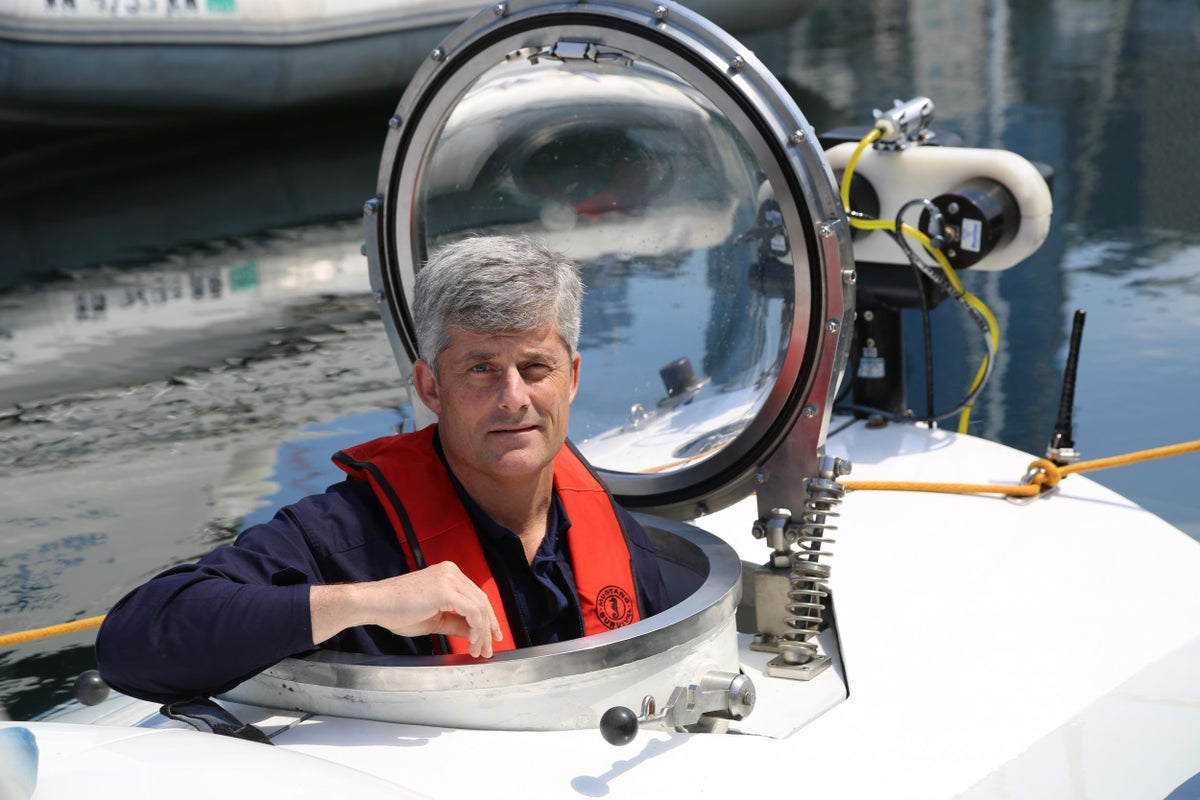
A friend of late OceanGate CEO Stockton Rush warned him against taking customers aboard the company’s Titan submersible four years before it tragically imploded in the depths of the Atlantic Ocean.
Karl Stanley, the owner of a diving expedition company in Honduras and a close friend of Mr Rush, went on a tour aboard the Titan off the coast of the Bahamas in 2019, The New York Times first reported. In emails obtained by Insider of an alleged exchange between the two deep-sea enthusiasts, Mr Stanley told Mr Rush that he had heard a large cracking sound while on the 12,000-foot-deep dive.
“I think that hull has a defect near that flange, that will only get worse. The only question in my mind is will it fail catastrophically or not,” Mr Stanley wrote in a premonitory email, years before the Titan’s catastrophic implosion that killed all five of its passengers.
Mr Rush tried to reassure his friend, telling him that experts had already noticed a reduction of the noise in two subsequent dives, but also noted that more dives should be launched in order to obtain reliable data. Mr Rush first told Mr Stanley that he thought “2-7 dives to operating depth [were] too few to launch an expedition selling 6 figure tickets in the middle of the ocean,” in reference to the $250,000-a-ticket price customers were asked to pay to join the expedition.
“I think 50 is a good #,” Mr Stanley replied, saying that was the number of times he ran tests with his own submersible and also the number of skydives a person must complete before obtaining a “B license.”
Mr Rush disagreed with the number, describing it as “arbitrary” and adding that testing “may take 2 dives or 20.”
“I suspect no deep diving sub did 50 MOD dives before non-essential crew were taken,” Mr Rush replied.
Mr Stanley eventually warned Mr Rush against letting his ego interfere.
“I don’t think if you push forward with dives to the Titantic this season it will be succumbing to financial pressures, I think it will be succumbing to pressures of your own creation in some part dictated by ego to do what people said couldn’t be done,” Mr Rush wrote.
OceanGate said in a statement to Insider that the company is “unable to provide any additional information at this time.”
Because the Polar Prince and the Titan operated in international waters, they were not subject to regulation by any country, including a US law requiring passenger submersibles to be registered with the Coast Guard.
Stockton Rush, the CEO of OceanGate, died during an expedition to the site of the Titanic wreck
This photo provided by OceanGate Expeditions shows a submersible vessel named Titan used to visit the wreckage site of the Titanic— (AP)
In 2018, 38 members of the Marine Technology Society’s Manned Underwater Vehicles committee wrote to Mr Rush expressing “unanimous concern” about the way Titan had been developed. According to The New York Times, the committee was alarmed that OceanGate had not subjected Titan to a standard risk assessment by Det Norske Veritas (DNV), an international maritime classification body that writes and maintains technical standards for undersea vehicles.
“While this may demand additional time and expense, it is our unanimous view that this validation process by a third party is a critical component in the safeguards that protect all submersible occupants,” the letter said.
OceanGate defended its decision in a 2019 blog post, writing: “When OceanGate was founded the goal was to pursue the highest reasonable level of innovation in the design and operation of manned submersibles. By definition, innovation is outside of an already accepted system... Bringing an outside entity up to speed on every innovation before it is put into real-world testing is anathema to rapid innovation.”
Large pieces of debris from Titan were transported to St John’s harbour on Wednesday by the Horizon Arctic ship, where they were seen being unloaded by a crane. The Coast Guard announced just hours later that medical professionals will formally analyse presumed human remains found on the debris.
Debris from the Titan submersible, recovered from the ocean floor near the wreck of the Titanic, is unloaded— (The Canadian Press via AP)
Officials from the Transportation Safety Board (TSB) of Canada board the Polar Prince, the main support ship for the Titan submersible— (PA)
Speaking after the evidence was recovered, the Marine Board of Investigation’s (MBI) chairman, Captain Jason Neubauer, said: “I am grateful for the coordinated international and inter-agency support to recover and preserve this vital evidence at extreme offshore distances and depths.
“The evidence will provide investigators from several international jurisdictions with critical insights into the cause of this tragedy.
“There is still a substantial amount of work to be done to understand the factors that led to the catastrophic loss of the Titan and help ensure a similar tragedy does not occur again.”
The USCG said the MBI intends to transport the evidence to a port in the US where they will be able to facilitate further analysis and testing.
The MBI will continue evidence collection and witness interviews to inform a public hearing about the incident, the USCG added.
Safety investigators from the Transportation Safety Board (TSB) of Canada made inquiries on Titan’s main support ship, the Polar Prince, after it docked in St John’s harbour on Saturday. The TSB said it has inspected, documented, and catalogued the materials from the debris of Titan for its safety investigation.
The safety body said its investigation team has taken possession of the deep-sea vessel’s voyage data recorder, which has been sent to its engineering laboratory in Ottawa for further analysis.
The TSB said it will continue to cooperate with the US, UK, and France in accordance with international agreements, as they are “substantially interested states” under the International Maritime Organisation Casualty Investigation Code.







